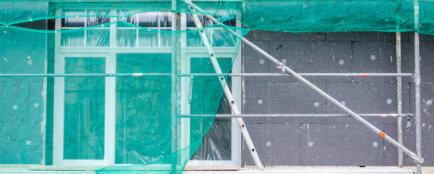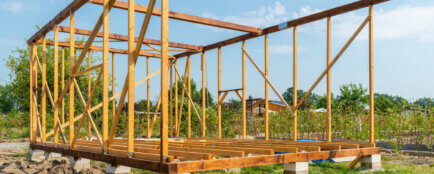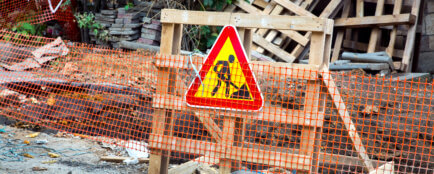Before you deal with the building authority
First of all, let’s imagine how we would feel if our neighbour, who has just moved in and whom we don’t even know properly, started renovation without a word. It is therefore a courtesy to let our neighbours know what is going to happen in our flat. If we can’t reach them at home, we can drop a note in their mailbox or post it on the bulletin board telling them that the renovation is taking place and from when to when the work will be done. In some cases, such notification is required by the house rules, and in other cases it is necessary to obtain the neighbours’ consent to notify the building or to obtain a building permit. It may therefore be an obligation, not just a courtesy.
Anyone carrying out renovation work on a dwelling must also observe night-time quiet hours. This lasts between 10pm and 6am. The municipality may set different hours, for example because of a local festival or fair, but it can only shorten them, not extend them. For disturbing the night peace, the officer called may impose a fine of up to CZK 10 000 on the spot.
When is/isn’t a building permit needed when renovating a flat?
The first important factor is whether you have a flat in so-called personal or cooperative ownership. In the case of a cooperative flat, the reconstruction must be approved by the cooperative according to the statutes. Even if you conclude that you need a building permit, the cooperative that owns the flat must apply for one. For a freehold flat that only needs internal renovation, you will not need the approval of the owners’ association. This is only necessary if you would be making alterations to the common parts of the building (for example, heat and water pipes, drains, balconies, etc.).
In what cases is reconstruction possible without a building permit or notification?
- The reconstruction does not affect the supporting structures of the building and preserves the original layout of the apartment.
- The modifications will not adversely affect the fire safety of the building.
- No environmental impact assessment will be required.
- You will not use unusual materials that differ substantially in weight from the original materials.
Themost common modifications, which include, for example, reconstruction of the apartment core, replacement of kitchen units, revitalisation of walls and ceilings, installation of new floor coverings or complete replacement of bathroom and toilet facilities, do not require planning permission.
Are you solving a similar problem?
Are you planning a renovation, but not sure what the building permits will be?
Or have you found yourself in an unpleasant situation where the building authority discovered a building without a permit? These and many other situations require legal intervention. Send us yours and you’ll be in the clear within 24 hours.
Benefit from a tailored solution to a legal problem
- When you order, you know what you will get and how much it will cost.
- We handle everything online or in person at one of our 6 offices.
- We handle 8 out of 10 requests within 2 working days.
- We have specialists for every field of law.
When will the property renovation need to be reported?
If you change the use of some parts of the building or the layout, but do not affect the supporting structures, you will only need to notify the reconstruction. This will be the case, for example, if you plan to break through a non-load-bearing wall between the living room and kitchen, move a toilet or enlarge a room at the expense of a storage room.
What alterations require planning permission?
Planning permission is required for any alterations that will affect the supporting structures.
What is the process for notifying a building and what do I need to prepare for?
This is a simplified procedure where there is no building procedure. After receiving the notification, the building authority examines whether the notified building meets all the conditions of the Building Act. If it finds in the affirmative, the building authority will issue an approval to carry out the notified construction within 30 days. Upon receipt of the consent, the two-year period within which the work must begin begins. If the building authority concludes that the mere notification is not sufficient, it shall order by resolution that a proper building procedure be carried out.
You will need the consent of your neighbours when notifying the building
The building authority will require, among other things, the consent of neighbours who may be affected by the renovation. If the consents are incomplete or if an omitted neighbour speaks up and says that he or she does not agree with the reconstruction, the building authority will enter the building procedure and decide whether to issue a building permit. What if the neighbour’s consent cannot be obtained, for example, because they are abroad for a long time? In this case, the notification is not sufficient. It is necessary to apply for a building permit.
Tip for article
Tip: All the necessary requirements can be found in the official building notification form.
What is the process for applying for a building permit for reconstruction?
A building permit for reconstruction is issued by the building authority on the basis of a written application. In contrast to the notification of reconstruction, in this case the affected persons are informed directly by the building authority. The application for a building permit must be accompanied by project documentation so that the building authority can assess the matter.
As an alternative to issuing a building permit, a so-called certificate of an authorised inspector can be issued. An authorised inspector will assess everything professionally, carry out an abbreviated building procedure and issue a certificate, the notification of which to the building authority carries the same weight as a building permit.
A story from our law practice: in our law office we consulted a situation in an apartment building, whose chairwoman, Mrs. Zlata, had long been taking care of the order in the building and supervising everything. She herself had an apartment on the top floor. It did not even occur to anyone that she had carried out a completely unnoticed reconstruction of her flat, but also its extension with a part of the common corridor, on the ceiling of which there was also an entrance to the attic. All this was done without building permits and without the consent of the HOA and the neighbours. The unit owners filed a complaint with the building authority, which investigated the matter and ordered the removal of the construction. Mrs. Zlata’s reconstruction did not pay off considerably and she had to restore everything in the common corridor to its original state at her own expense.
What can you do if the building authority discovers you are building without permission?
In such a case, the authority will initiate proceedings for the removal of the building. At that point, you have the option of applying for an additional building permit within 30 days. The documents you will need are the same as if you filed on time. However, the building code requires you to prove that the structure is not in violation of building or zoning requirements, which can be complicated.
A supplemental filing does not have a universal application document, so it may be best to check directly with your building official to find out which application to use.
Tip for article
Tip: Martin Perlík has written answers to the 6 most common questions about building permits in his article.
What about the reconstruction of a property that is subject to heritage protection?
Owning a house or flat in a conservation area, or a listed building with high ceilings, wooden windows, mosaics and other features, has its disadvantages. Conservationists are entitled to demand that cultural heritage is not turned into a funfair. In a binding opinion, they prescribe what procedures, materials and components may be used in the reconstruction. Most often in such houses, wooden windows cannot be replaced with plastic ones, and the houses cannot be insulated from the outside, thus ruining their original spirit. Other restrictions may be adopted depending on the specific situation. Of course, fines may be imposed for failure to comply with the conservation officers’ instructions.
Tip for article
The Constitutional Court has already ruled that these restrictions are not illegal. Ownership is binding, and the state provides various incentives and subsidies to owners of cultural monuments to compensate them for at least part of the costs of increased care, albeit insufficiently.
We prepared this article for the Lidové noviny series “Law & Housing”. See also other articles from the series:
- What to watch out for when buying a property
- How to get a mortgage
- What to check before buying a property
- Who pays the property transfer tax and how?
- What should be included in the property purchase contract
- The most common mistakes when drafting a proposal to the Land Registry
- Buying a property from a developer
- Keeping the purchase price when buying a property
- The difference between a condominium and a freehold
- What is an annuity?
- How to properly gift a property
- What is the purpose of an easement or servitude?
- Making a will and settling an estate
- What is a collation
- What shouldn’t be missing from a lease agreement
- When rent increases can be made
- Termination of the lease
- Agreement to end the tenancy
- How to draw up a work contract with a tradesman
- Hidden defects and cancellation of a works contract
- When do you need planning permission to renovate a property?
- Home Rules
- What does serving on a condominium board entail?
- Why not underestimate the bylaws in a condominium
- Common areas in a block of flats
- What is involved in refurbishing a block of flats
- Can a condominium or housing association go into debt?
- How to renovate a house or cottage
- What to watch out for when dealing with a construction “company”?
- Building a house on a “green field”
- How to remove land from the agricultural fund





